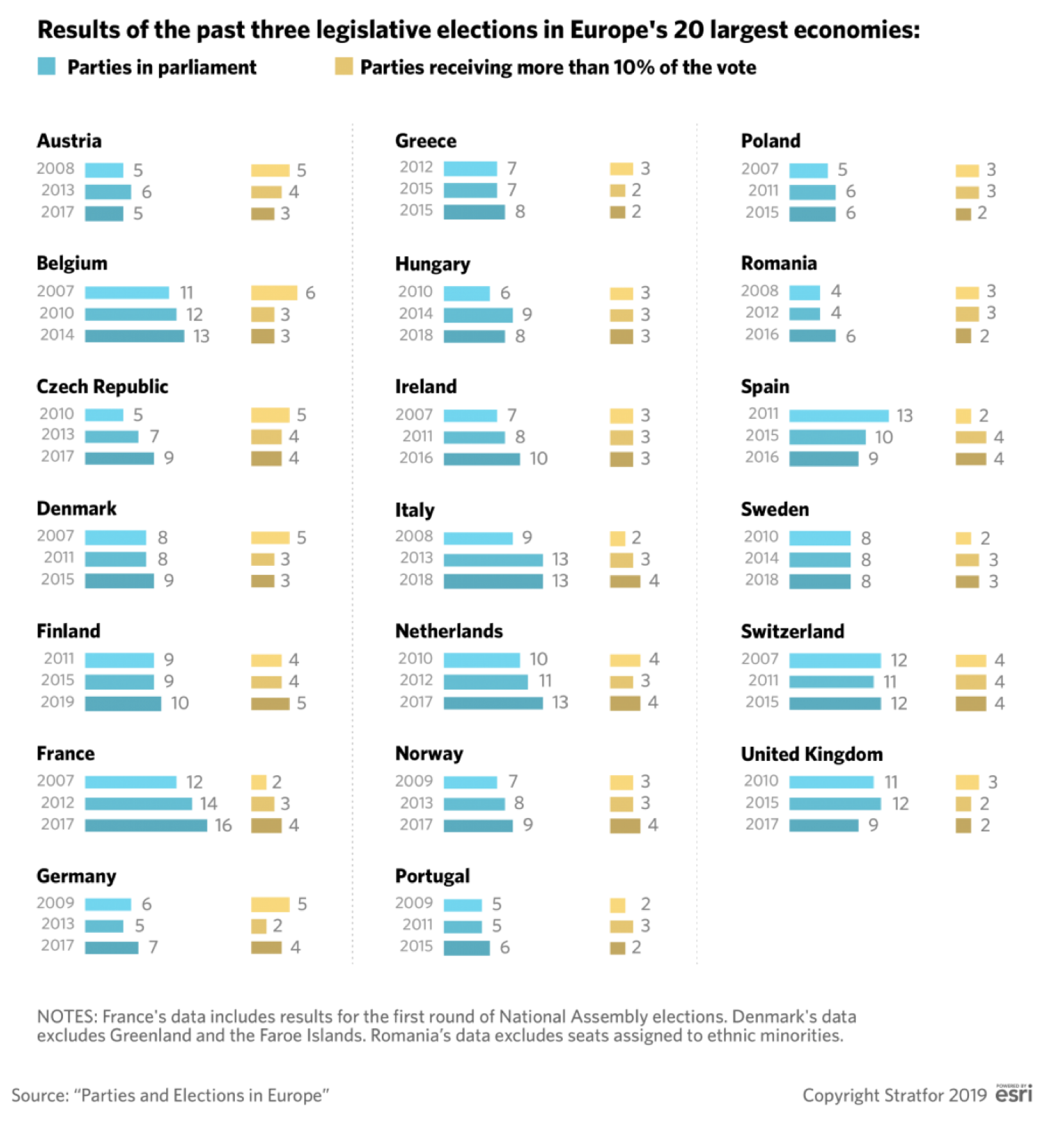|
Getting your Trinity Audio player ready...
|
Are democracies fragmenting? It certainly appears so. In numerous democratic political systems around the world, we are seeing a rise in the success of minor parties and independent candidates. Major parties – on both sides of the political spectrum – that have dominated for generations are failing to retain their vote. Power is increasingly being split more ways.
In Spanish elections last month, we saw the far-right Vox party entering the Congress for the first time. This continues a trend that has been observed in many parts of Europe. In Germany, as we have written about before, the far-right AfD party has gone from mid-single-digits popularity just a few years ago to around 18-19 percent today. Indeed, following the SPD’s recent decision to form a government with the CDU/CSU, the AfD is now officially Germany’s largest opposition party.
In France, Italy, the Netherlands and even Norway: we have seen a continual increase in both the number of political parties in parliament and the number of parties receiving more than 10 percent of the vote, as shown by the chart below.


In the US, while the political system is built around the Democratic Party and the Republican Party, we have certainly observed significant divisions and fragmentations within both parties over recent years. For the final six years of President Obama’s time in office, the Republican-controlled House of Representatives was often “held hostage” by members identifying with the conservative Tea Party movement. The election of President Trump in 2016 was, in and of itself, a clear shift of power to the “anti-establishment” movement. On the Democratic side, the impending primary election to decide on the party’s candidate for the 2020 general election has uncovered wide divisions. Support is split between leftists, like Bernie Sanders, and centrists, like Amy Klobuchar – and no fewer than 23 other diverse candidates in between.
In the recent Australian federal election, minor right-leaning parties One Nation and United Australia Party continued to grow their share of the vote. And under Australia’s unusual preferential voting system, these parties will likely become a valuable source of preferences for the major parties going forward – in exchange for influence on key issues no doubt.
TECHNOLOGY IS DISRUPTING THE ESTABLISHMENT
There are many reasons why this political fragmentation is gathering steam. In our simplistic minds, we view the drivers of change through the lens of demand and supply.
There is demand for new political parties and independent candidates that look different to the mainstream parties that have dominated for so long. In many parts of the world, constituents feel like the major political parties are out of touch with their reality. Unemployment has been high in countries like Spain and Italy since the 2008 financial crisis. In Germany, many are not happy with recent immigration policies. In the US, there is a feeling that most career politicians on both sides of the aisle are Washington-establishment types beholden to corporate lobbyists.
New parties and independent candidates are successfully supplying this demand. And it has been the emergence of social media platforms and highly-targeted digital advertising which has enabled the growth of these parties. In many ways, what we are seeing in political systems is not unlike what we have observed in the consumer packaged goods space – in which consumers are rejecting the big corporate brands that have dominated for decades and replacing them with fresh new start-up brands (as we wrote in our 2018 whitepaper here).
Is it a coincidence that a reality TV star is the President of the United States? That the most popular political party in Italy was established by a comedian? Or that the recently elected Ukrainian president was also professional comedian with no political experience? A common denominator here is that these entertainers are highly-skilled at leveraging technology to target and connect directly with constituents – particularly those who are sick of the status quo political establishment.
DEMOCRATIC FRICTION, AUTOCRATIC RISE
One of the obvious consequences of political fragmentation is increased legislative “friction” in the sense that agreement is more difficult and time consuming to reach the more parties that need to be satisfied. Indeed, in many instances the friction can increase so much that the legislative process becomes gridlocked and breaks down almost completely. We have seen instances of this gridlock in the US over the last decade, in Germany, in Italy and also in Australia.
And while the dysfunction in many fragmenting western democracies increases, the effectiveness of autocracies appears to be growing from strength to strength. Secretary General Xi of the Chinese Communist Party (CCP) has successfully removed his term limits, inserted “Xi Jinping thought” into the CCP’s Constitution and has taken effective personal control over all major organs of the party. He can make decisions quickly, unilaterally and without question. Interestingly, China’s strict control over many of the technologies that are enabling the fragmentation of western democracies is actually further consolidating the power of the CCP. From state surveillance, to facial recognition, to drones disguised as birds (seriously[1]) to social scoring systems (which we’ve written about here).
Similarly, in Russia, President Putin has successfully navigated his constitutional term limits since taking power in 2000; and only months ago the speaker of Russia’s parliament raised the possibility of a change to the nation’s constitution regarding presidential term limits. As in China, President Putin has effectively and decisively consolidated power. Putin’s decisions are also unilateral and effected without question.
There are others too. In Saudi Arabia, Crown Prince Mohammad bin Salman has all but taken control of the Saudi Kingdom and has already effected the brazen assassination of US-resident journalist for the Washington Post, Jamal Khashoggi, according to the CIA. Such a targeted killing in broad daylight of a US resident would have been unheard of in recent times, but today’s autocrats appear to be growing in confidence. Indeed, the global public outcry against the Khashoggi killing has not appeared to derail the Crown Prince: in recent weeks, the CIA and foreign security services have warned friends and colleagues of Khashoggi that their continuation of pro-democracy work has made them targets of potential retaliation from Saudi Arabia.[2]
IS DEMOCRACY BEING UNDERVALUED?
It appears we are living in a world in which western democracies are fragmenting and their decision-making efficiency is eroding; while, at the same time, many global autocracies are flourishing. For those who believe in democracy as a fair, safe and sustainable system of political power distribution (including your author), this trend is concerning.
It should also be concerning for global equity investors. Embedded in all equity valuation models is some implicit assumption about the going concern of the business for the long term. And implicit in this idea is the longevity of the basic laws, and enforcement of those laws, around property rights. And of course, property rights are typically preserved in democracies and often violated in autocracies.
Finally, evidence is mounting that millennials do not see the value in democracy that older generations have fought and died for. In a 2017 study[3], one quarter of millennials surveyed in the US agreed that “choosing leaders through free elections is unimportant.” If true, the ground is fertile for a continuation of these trends we are seeing around the fragmentation of democracies and the rise of autocracies.
[1](CNET) China launches high-tech bird drones to watch over its citizens, August 2018
[2](Al Jazeera) CIA warns Khashoggi associates about threats from Saudi Arabia, May 2019
[3](NBC) Is democracy essential? Millennials increasingly aren’t sure — and that should concern us all, February 2018
Andrew Macken is Chief Investment Officer with Montaka Global Investments. To learn more about Montaka, please call +612 7202 0100.




